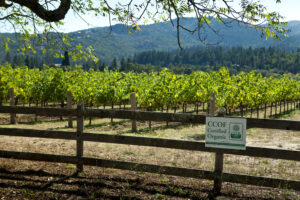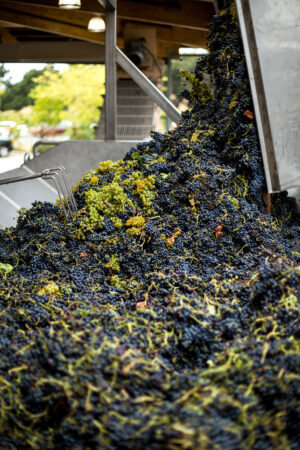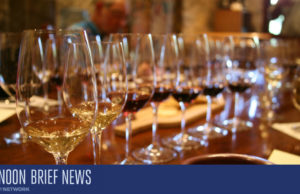As the labyrinth of wine industry certifications continues to expand, consumers often find themselves without a compass.
By Deborah Parker Wong
Nearly half of American adult drinkers of beverage alcohol (48%) say they are “positively influenced” to buy brands that have demonstrable environmental or sustainability credentials, according to IWSR’s 2021 research. As U.S. wineries rush to embrace sustainable business practices in response to the increasing value of sustainability in the marketplace, farming practices are often their lowest priority.

“Younger consumers (millennials and Gen Z of legal drinking age) are significantly more engaged with sustainability; they view it as increasingly important to protect the future, and have a strong affinity towards sustainable wine certifications,” says Lulie Halstead, CEO of Wine Intelligence, speaking about consumer perceptions of sustainable wine during an online seminar hosted by the California Sustainable Winegrowing Alliance.
A key driver from her talk points to consumers seeking easy ways to find and identify sustainable wine. According to Halstead, sustainability certifications for wine provide these buyers with transparency and reassurance. But do they?
Unclear definitions
Beyond the wine industry’s most transparent certifications, which include the CCOF (California Certified Organic Farmers) and USDA organic programs and the Demeter Biodynamic certification, there is not a single certification governing sustainable winegrowing in the United States that prohibits the use of synthetic herbicides. When it comes to farming practices, it’s far from easy to substantiate a winery’s claims of environmental sustainability. While logos give the impression that a standard is being adhered to, they don’t spell out the trade-offs that make it possible for a winery to use herbicides and pesticides while prioritizing other aspects of the certification.
Even the most contentious consumers, three in five of whom say they look for information about a brand’s sustainability practices at least somewhat often — and, of those, one in five checks frequently — are extending their trust to brand claims. For wineries that are not certified organic or biodynamic, the only way for a consumer to validate claims about winegrowing practices is to ask the right person the right questions or to track down the winery’s pesticide use report (PUR), which in California is public record.
Unclear priorities
When young adults studying viticulture and enology were assigned to read an article discussing the Slow Wine Guide USA, the nation’s only eco-curated guide to wineries that farm transparently, then asked if eliminating synthetic herbicides is essential if a winery claims to farm sustainably, their answers revealed a profound lack of understanding about the complex tradeoffs associated with claims of sustainability. As illustrated by one student’s response, “Customers or critics should be considering waste management or solar units before looking at something as small a business as weed control techniques.”

The recurring theme of prioritizing recycling, solar power, water and carbon footprint reductions at the expense of the health of the soil and, in turn, the people to work and live on the land points to the success of the wine industry’s obfuscation and the catch-all term of “sustainability.”
In a recent survey on sustainability conducted by Morning Consult, protecting local ecosystems, minimizing plastic waste, and reducing carbon emissions are seen as the most important environmental priorities by U.S. consumers aged 18 to 55. A majority of those consumers picked a new brand or product specifically because of the company’s stated sustainability practices. What consumers say they believe about sustainability and the choices they make when acting on those beliefs are known to underperform. How has the protection of the ecosystem fallen so far down the list of priorities for consumers defined as those who are the most concerned?
Unclear sustainability
Weed control is, in fact, big business for the corporations that manufacture and sell synthetic herbicides. While lawsuits and trials play out in courts across the nation in an effort to hold manufacturers accountable for the toxicity of their products, the wine industry is complicit in burying the use of synthetic herbicides behind a logo touting sustainability.

It’s common to see wineries pick and choose initiatives that are easiest for them to adopt and implement or those that return the most cost savings and then communicate their efforts using a blanket approach that leads consumers to believe those sustainability efforts extend to their farming practices. Blissfully unaware of the deception, consumers seem content to prioritize initiatives like recycling and solar power, the most familiar to them, in lieu of land stewardship.
While still opaque to consumers, the future of sustainability will likely to be more transparent as the wine industry begins to adopt ecoperformance-based loans that require a publicly disclosed sustainability report and stated environmental, social and governance (ESG) goals.
Editor’s Note: Sustainable, organic and biodynamic practices obviously impact more than just a winery’s carbon footprint. Wine quality can be drastically different depending on the health and treatment of vineyard soils. To learn about one study’s findings, consider joining Enoforum USA in Sonoma County, Calif., on May 11, 2022, where University of Florence, Italy’s Valentina Canuti will present “The Effect of Organic, Biodynamic and Conventional Production Processes on the Intrinsic and Perceived Quality of a Typical Wine.”
_________________
 Deborah Parker Wong
Deborah Parker Wong
Deborah Parker Wong, DipWSET, was appointed national editor, USA for the Slow Food Slow Wine Guide in 2020. As global wine editor for sister publications the SOMM Journal and The Tasting Panel magazines, she has been writing about the beverage alcohol industry for these and other outlets since 2004. She teaches as an adjunct professor in the Wine Studies departments at Santa Rosa Junior College and Cabrillo College and owns a Wine & Spirit Education Trust school offering Level 2 and Level 3 certifications. In addition to writing and speaking about wine, she is currently pursuing a Master’s Degree in Viticulture and Enology at California State University, Fresno. www.deborahparkerwong.com



















Curious that this article singles out herbicides – as if its a ‘given’ that all herbicides are bad for soil health. Mechanical weed cultivation is also bad for the soil, and releases more greenhouse gasses. Hmm. And no mention of the fungicides used? Or the idea that vinifera grapes themselves are not resistant to diseases that originated in North America. If you really want to be sustainable, why not plant disease-resistant varieties (aka ‘hybrids’).
There are tradeoffs to all practices, and it seems misguided to single out one practice.
Nice perspective.
I applaud my neighbor who is embracing Lodi Rules. They manage a lot of vineyards and have a lot of employees. Lodi Rules is good for workers. You can be certified Organic and have terrible treatment of workers.
Since I only I have occasional part time workers, they paperwork is not worth the issue. We pay above average, we give as much flex time as possible. With the current labor situation, I assume that if I have no issue getting vineyard help on occasional basis, I’m being a good employer.
I’ve been a critic of USDA, WSDA Organic since I got involved in 1988. Every certification group has issues that don’t meet my standards. No packaging requirements?
We have been producing Zero Pesticide, ingredient labeled wines, in lightweight bottles since 2013. Should we use a pesticide, it will be listed on the label.
Seeking partners to get a 300 gram bottle in the market.
Oh, yeah, solar powered winery for ten years, now trying to rationalize an electric tractor, but our tractor use is small.
Paul Vandenberg
Paradisos del Sol Winery and Organic Vineyard